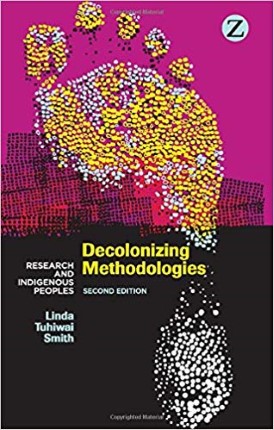Decolonizing Methodologies—Linda Tuhiwai Smith (1999)

Today we celebrate the final 150th Te Takarangi book with Professor Linda Tuhiwai Smith’s landmark publication Decolonizing Methodologies. This revolutionary text first published almost 20 years ago, continues to resonate powerfully with indigenous scholars and indigenous communities globally.
Publication details
Smith, L. T. Decolonizing Methodologies. Research and Indigenous Peoples London, UK: Zed Books, 1999 (and Otago University Press).
About the book
Professor Linda Tuhiwai Smith’s (Ngāti Awa, Ngāti Porou) essential text Decolonizing Methodologies is an extensive critique of Western paradigms of research and knowledge. Smith challenges traditional Western ways of knowing and researching and calls for the “decolonization” of methodologies, and for a new agenda of indigenous research. According to Smith, “decolonization” is concerned with having “a more critical understanding of the underlying assumptions, motivations and values that inform research practices”.
Decolonizing Methodologies is divided into two parts. The first part discusses the history of Western research and critiques the cultural assumptions behind research by the dominant colonial culture. The second part focuses on setting a new agenda for indigenous research.
In the first part of the book, Smith deconstructs the assumptions, motivations and values that inform Western research practices through exploring the Enlightenment and Positivist traditions in which Western research is viewed as a scientific, “objective” process. Under this Western paradigm, colonisers, adventurers and travellers researched the indigenous Other through their “objective” and “neutral” gaze. Their stories became accepted as universal truths, marginalising the stories of the Other. Smith describes this as “research through imperial eyes”.
The second part of the book is targeted at indigenous researchers and those working with, alongside and for indigenous communities. This part focuses on setting an agenda for indigenous research and addresses some of the issues that continue to be discussed amongst indigenous communities. Smith advocates the value of research for indigenous peoples and the need to retrieve spaces of marginalisation as spaces from which to develop indigenous research agendas.
Further information
This publication is part of the series Te Takarangi: Celebrating Māori publications - a sample list of 150 non-fiction books produced by a partnership between Royal Society Te Apārangi and Ngā Pae o te Māramatanga.
